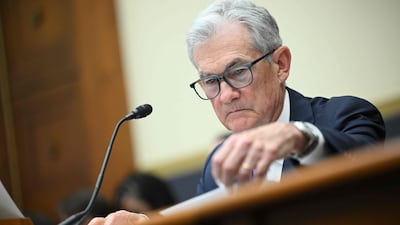Federal Reserve Chairman Jerome Powell told US politicians on Wednesday that he expects significant changes to the US central bank's proposed rule on capital banking requirements, after opposition from legislators and banks.
The proposal, which was introduced by Fed vice chairman for supervision Michael Barr, would require big banks to raise their capital requirements by about 20 per cent to absorb potential losses, which exceeds the Basel 3 Endgame requirements.
The rule would apply to banks such as Wells Fargo and JP Morgan, whose assets range between $100 billion and $250 billion.
“It's more important that we get this right and that we do it fast,” Mr Powell said during the question-and-answer part of his testimony before the House financial services committee.
"We understand that this is an important rule-making [process] and it's going to have potential implications for the economy and the people we serve."
As Mr Powell and members of Congress were discussing the proposed rules changes, the troubled New York Community Bank secured a $1 billion capital raise from companies in a move that would also bring former Treasury secretary Steve Mnuchin to its board.
Shares of NYCB, which acquired the failed Signature Bank last year, rebounded after the announcement. Before trading was halted on Wednesday afternoon, its shares were down by more than 40 per cent.
The bank has recently come under tremendous pressure after a filing showed "material weaknesses" in the company's internal loan review controls.
Big banks and Republicans have offered the most vocal opposition to the Fed's new rules.
But proposals have also received criticism from some Democrats who say they could hurt small businesses by cutting off access to credit.
“Members on both sides of the aisle on this committee and in Congress have made clear the Basel 3 Endgame proposal would be catastrophic for families, communities, small businesses. Regulators should withdraw it and start over,” committee chairman Patrick McHenry said.
Mr Powell said the Federal Reserve has not made a decision on a re-proposal, but would not hesitate to do so.
“We do hear the concerns and I do expect that there will be broad material changes to the proposal,” Mr Powell said.
“I'll add that I am confident that this final product will be one that does have broad support … in the broader world.”
The proposal is a continuation of a rule global regulators have sought to introduce after the 2008-09 financial crisis.
US regulators approved the proposal last summer after the collapse of three regional US banks sparked fears of a new global crisis.
Those failures were largely blamed for poor management, although a Fed review also criticised the regulator's supervisors.
Mr Powell told the House panel that the Fed is monitoring banks with "significant concentrations" of commercial real estate and having conversations with them on how they plan to deal with potential losses.
"The idea is you've got to have enough capital, enough liquidity and a plan to take the losses that you're probably going to take, and so that's what we're doing," he said.
But the new capital requirements proposal has faced opposition from even within the Fed's own building.
Fed Governors Michelle Bowman and Christopher Waller voted against the proposal in July, saying it would hurt consumers. And while Mr Powell voted in support, he also voiced scepticism.
The Fed has extended its comment period on the proposal until May 12.


